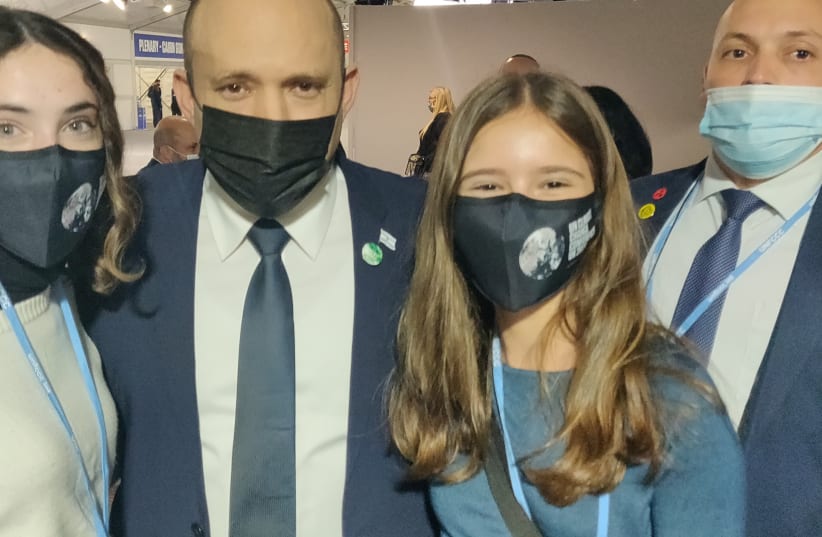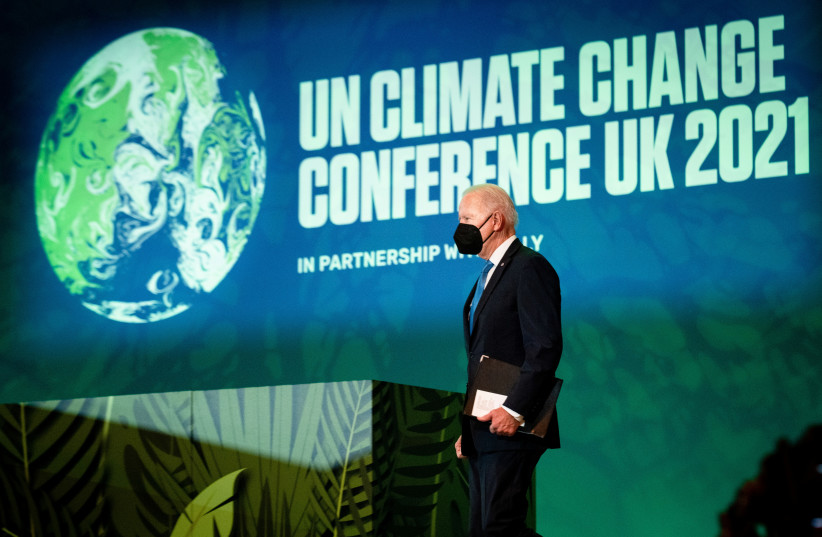GLASGOW – Fresh off his budget victory in the Knesset, will Prime Minister Naftali Bennett now roll up his sleeves on climate change and dig into the details he outlined last week at the UN Climate Conference? He promised as much to Israeli teens Alma Pomagrin, 15, and Lia Lev, 16, activists from the Strike4Climate group who traveled to Glasgow last week to hand the prime minister a letter from Israel’s teens on the day he spoke at the COP26.
Strangely echoing his predecessor’s speech six years earlier at the Paris Climate Conference, Bennett stood before 120 heads of state last week in Glasgow and extolled the virtues of Israeli innovation. By doing so, he avoided taking a stand on any of the key climate issues facing Israel, other than the welcome but empty pledge that Israel will be carbon net-zero by 2050.
But Bennett seemed to be genuinely moved by what he heard and saw here in Glasgow, and Alma, Lia and their friends may shortly be in for some pleasant surprises.
Bennett’s main achievement at Glasgow was getting Bill Gates excited about the future of Israeli climate innovation. The prime minister knows full well that for Israel and Israeli technology to be a showcase for the world, we have to get our burning house in order quickly.
Israeli ministers and directors-general of the relevant ministries – Energy, Environment, Interior, Finance, Transportation and more – all complain how complicated it would be for Israel to join the international community’s ambitious goals for renewable energy.
On the other hand, if the US and the EU – far larger and more complicated political entities – have declared climate emergencies, passed ambitious climate laws, took complicated and coordinated government decisions, stood up to their gas and oil lobbies and prioritized green growth, then certainly tiny Israel can as well.
There are six things that Bennett can do, working together with his relevant ministers.
- Declare a climate emergency, like dozens of other Western countries have done. By doing so, key government bodies like the Public Utilities Authority – the electricity regulator that is the major stumbling block to a solar Israel – need to take climate into serious consideration in all their decisions and accelerate the roll out of renewables – centralized and dispersed – for climate and national security reasons.
- Create an open market. Solar quotas are one of the last vestiges of Israel’s socialist roots, choking market forces that would accelerate investments, scale and innovation and create thousands of green jobs. As Prince Charles said here in Glasgow, the private sector can move much faster than governments. Today in Israel, there is no framework for an open-market for green energy companies to develop projects and sell to willing customers, like from industry, the military or municipalities. Prices would go down quickly, solar fields with storage would go up fast and the energy market would be dynamic, which would represent an economic and climate win. Five thousand megawatts would be created between now and 2030, representing $5 billion in private sector investments.
- Dual-use Agro-Voltaics. 100% of Israel’s daytime energy needs would have been met today by solar – as we have already done in Eilat and the Arava – if each of the 900 kibbutzim, moshavim and Arab villages was allowed to produce 25 megawatts on a small portion of their agricultural land. The way around Israel’s nightmare rezoning regulations and to maintain our food security, immediate dual-use permission can be given for these communities to put solar above a portion of their agricultural lands, much like greenhouses. This would attract about $20b. in investments and create thousands of green jobs, most in the periphery.
- Free up lands for renewables, especially in the Golan and in the Negev. While a five-year moratorium on new wind projects in order to study the impact of the ones going up now would be a welcome decision, there are ways to free up land in ways that do not interfere with ecological corridors, especially if we convert just 1% of closed military zones to renewable zones. On those fields, all citizens of Israel could be part of the solar revolution through virtual net metering or community solar gardens, meaning that even if one is renting or does not have roof-space for solar, their meter can be virtually linked to 10-20 panels elsewhere in the country and lower electric bills and carbon footprint.
- Climate justice for Arab-Israelis. The growing political sophistication of the Arab-Israeli community creates an opportunity for Israel to end discrimination in the energy sector while advance both economic and social development and achieve ambitious climate goals. Ra’am Party chairman Mansour Abbas, fulfilling the legacy of his recently deceased friend and MK Saeed Alharomi, believes that a special quota for solar power is needed for Arab-Israelis, with affirmative action on interconnection to the national grid, rezoning and tax benefits. This would bring in $5b. in private sector investments into the Arab-Israeli community and create thousands of jobs.
- Free up the shared rooftops. While hot water panels are ubiquitous in Israel, it has only been worthwhile for private roof owners to put solar panels for electricity since that income is exempt from VAT tax. Since 80% of Israelis live in shared buildings, most Israelis do not have solar power, which means that the benefit has been for the rich. Applying the same exemption from VAT to shared meters on shared rooftops, where external investors can invest into generation meters, would fast produce 5,000 MW on Israeli rooftops, which also enhances our national energy security in case the grid goes down by Hezbollah rockets, an earthquake or Iranian cyberattack.
Israeli technological innovation is definitely part of the global solution to the climate crisis but first Bennett needs to lead through political and economic innovation in order to put Israel on the right side of history and spur unprecedented private sector investment in our energy sector.
Implementing best practices from the world, on display in Glasgow, would make Israel finally a renewable light unto the nations.
The writer is Israel’s solar pioneer and can be followed @Kaptainsunshine.
The Environment and Climate Change portal is produced in cooperation with the Goldman Sonnenfeldt School of Sustainability and Climate Change at Ben-Gurion University of the Negev. The Jerusalem Post maintains all editorial decisions related to the content.

